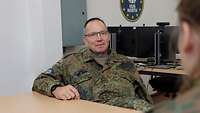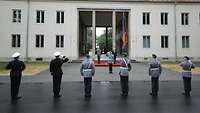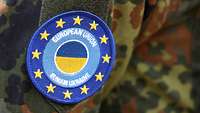EUMAM UAEuropean Union Military Assistance Mission Ukraine – The Instructors of Hub North
EUMAM UAEuropean Union Military Assistance Mission Ukraine – The Instructors of Hub North
- Date:
- Place:
- Strausberg
- Reading time:
- 5 MIN
Hub North is the largest training centre for Ukrainian soldiers in Germany. In order to convey the necessary knowledge and skills within a very short time, instructors must be available practically 24 hours a day. Colonel Zuckschwerdt, the commander of Hub North, explains how their everyday life looks like and what challenges they have to face every day.
Colonel, Hub North is said to be a hub for EUMAMEuropean Union Military Assistance Mission training courses in northern Germany. What training courses are currently being conducted at Hub North?
Together with our multinational partners and instructors from industry, we offer infantry combat training modules at the locations of Hub North in addition to the training of Ukrainian armoured infantry, armoured forces and assault engineers. In this context, the training contents are regularly updated and adapted to the needs of the Ukrainian military.
How do the instructors themselves get prepared for their assignment at EUMAM UAEuropean Union Military Assistance Mission Ukraine?
In preparation for each training course, a one-week “Train the Instructor” training course takes place. This training course initially is to provide harmonization among the instructors and to develop common positions. This step is especially important if the instructor staff is made up from different troops, as is currently the case in the infantry combat training “Fighting in Complex Terrain”. In addition to German airborne and mountain infantry, this module also includes soldiers of our multinational partners as instructors. They must first be familiarised with the German weapon systems and safety regulations before the training activities can be prepared jointly.
The aim should always be to make the planning as flexible as possible in order to be able to respond to sudden situation changes. Although we know in advance how many Ukrainian servicemen and women are to participate in the respective training course, the actual number of participants varies depending on the course of the war. Moreover, we do not know the level of prior knowledge of the Ukrainian soldiers: On the one hand, we see experienced military leaders who have already been deployed on the front, and, on the other, recruits who have only recently been conscripted to defend their country.
How do you manage to offer a goal-oriented training to all participants despite their different level of prior knowledge?
For us, target-oriented training means training in accordance with the principle of mission tactics. This means that the respective instructors have the freedom to adapt their training methods to suit each groups's needs and to decide themselves how the training objective can be achieved best. For this purpose, a so-called learning group analysis is conducted at the beginning of each training course in order to determine the training level of the Ukrainian soldiers who have come to participate in the training and to adapt the training accordingly.
In addition, we make use of the trainees' prior knowledge by involving, for example, leadership personnel or soldiers with front-line experience in the planning of the training. In view of the conditions on the front line, the Ukrainian soldiers often have only a few weeks to be trained.
This relatively short period of time must be used as effectively as possible by means of flexible planning and prioritisation. It is important to find the right balance between what Ukraine says must be trained and what is actually possible and useful considering the current situation. With each new training course, we gain more experience that will help us to further optimise the planning and conduct of the training courses.
What is the daily work of the instructors of EUMAM UAEuropean Union Military Assistance Mission Ukraine?
The instructors, who are well-experienced instructors of all arms and services, must be available on six days a week, just like the Ukrainian soldiers. Only on Sunday, what we call “base day”, we have a training-free day which can be used for regeneration or attendance of welfare and care offers.
An average training day starts at 05:30 in the morning with breakfast and preparatory measures, so that we can get started at 07:00 o’clock. The end varies depending on the training level and the receptiveness of the Ukrainian soldiers, who are very motivated and eager for knowledge.
After the regular training, which often lasts up to 12 hours a day, special follow-on training is offered for Ukrainian leadership personnel depending on the composition of the group. Flexible and long working hours are necessary to achieve the training objectives in such a short time, but of course they are also very demanding for all participants.
What challenges do instructors have to meet during this mission?
In addition to the long working hours, the unpredictability of this mission confronts us time and again with new challenges. Short-term changes are commonplace and require a flexible system allowing us to adapt the training contents at any time. Planning must also take into account that each training step must first be explained by an interpreter, which further reduces the scarce time available for training.
In addition, the psychological strain of this mission must not be underestimated. In order to be able to train effectively, we have to gain the confidence of the Ukrainian forces without making friends with them. A large part of the Ukrainian soldiers will return to the front line immediately after training. Unfortunately, the experience shows that some of them will get wounded or even killed in the near future.
Although a strict separation takes place after training, soldiers staying for a period of several weeks may begin to talk about their personal situation, especially those who have a gift for languages. In order to counteract this mental stress, we are in close contact with the psychosocial support network of the Bundeswehr, e.g. psychologists or chaplains who can immediately provide support if needed.
What is the future planning of Hub North?
The current Hub North training courses will be completed by mid-December. From todays’s view, we will once again provide various training sessions for Ukrainian soldiers next year. For example, it is planned that airborne and mountain infantry will conduct the training of two Ukrainian infantry units in a concerted manner as of January of next year.
It is intended that a third infantry unit will undergo training by our multinational partners at the same time. Whether these training courses will take place as planned will only become clear next year, but we are prepared to continue to conduct exactly the training that is needed.




